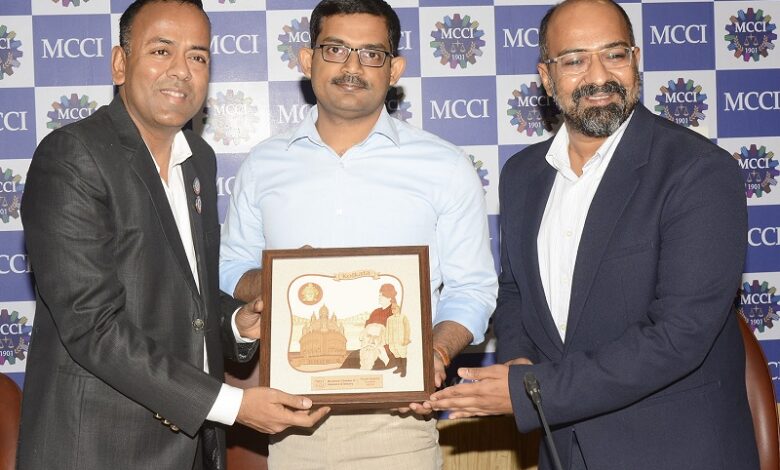“Implementing Cyber Security: Best Practices and Hygiene” at MCCI Conference Hall.

Merchants’ Chamber of Commerce & Industry organised a Session on “Implementing Cyber Security: Best Practices and Hygiene” on 4 August at MCCI Conference Hall.
The Session was addressed by Shri Sayak Das, IPS, Special Superintendent of Police, Cyber Crime and Economic Offence Wing [EOW], Criminal Investigation Department [CID], West Bengal; Shri Supratim Chakraborty, Partner, Corporate & Commercial, Privacy & Data Protection, White Collar Crime, Khaitan & Co and Shri Bharat D Sarawgee, FCA, Partner, BDS & Co.
Shri Das, in his address said that Cybersecurity Ventures expects global cyber crime costs to grow by 15 percent per year over the next five years. However, Govt. of India has set up CERT-IN and Cyber Security Center of Excellence along with is doing its best to control cyber crimes. West Bengal Police have trained more than 800 of its Police officers and 400 Judicial Officers / Public Prosecutors in handling cybercrime.
Shri Das also informed that the complaint against cyber crime has increased 6th times over the last two years. The two major areas of cyber crime are Social Media Related Crime and Online Financial Fraud. He also pointed out that sectors including Electricity Bill Fraud, Fake Loan App, Cyber Fraud using Telegram, Call Centre, Work From Home, Debit / Credit Card Fraud, Phishing Email & Call Spoofing, and Sextortion have already been considered threat areas of cyber crime.
Shri Das mentioned that Malware poses a significant threat to corporates leading to Data Breaches, Financial Losses and Reputational Damage. To fight against malware protection, the corporate needs up-to-date antivirus software, firewalls, and security patches and corporate needs to back up critical data to minimize the impact of a ransomware attack.
Shri Das also informed that Fake Crypto Exchange, Crypto Mining Frauds , Deep Fake or Voice Cloning, Bad use of Artificial Intelligence, Distributed Denial of Service (DDoS) and Advanced Malware Based Ransomware Attacks are the major Cyber trends to watch out for in 2023.
Shri Supratim Chakraborty, Partner, Corporate & Commercial, Privacy & Data Protection, White Collar Crime, Khaitan & Co in his address informed that one should report on Cyber Security incident to CERT-In within 6 hours of noticing such incidents or being brought to notice about such incidents. He further added that Virtual asset service providers, virtual asset exchange providers & custodian wallet providers to mandatorily maintain (a) KYC records & (b) records of financial transactions, for 5 years.
Shri Charkraborty mentioned that DIGITAL PERSONAL DATA PROTECTION BILL 2023, aims to make entities like internet companies, mobile apps, and business houses more accountable and answerable about collection, storage and processing of the data of citizens as part of “Right to Privacy”
Shri Bharat D Sarawgee, FCA, Partner, BDS & Co in his address said that the post-pandemic era has witnessed a significant increase in cyber-attacks, posing a severe threat to the digital infrastructure of organizations. Especially remote working has made organizational networks more vulnerable to cyber-attacks, including malicious software that can be deployed to compromise networks.
He further mentioned that companies should conduct regular cyber security training programs to educate employees about the latest threats and attack techniques and the companies should train employees on cyber security best practices for handling sensitive data, recognizing suspicious activities and reporting incidents promptly.
Shri Yashovardhan Gupta, Chairman, Council on IT & Communication, MCCI in his Welcome Address said that India is in dire need for effective cyber security. 20% of all data stolen or exposed globally belong to Indians. India also reported the 2nd highest number of breach incidents or events where hackers were able to gain access of vulnerable networks and systems.
“Organizations should have a holistic approach towards Cyber hygiene, which calls for both technical and nontechnical challenges to be addressed by businesses”, suggested Shri Gupta.
Shri Sanjib Sanghi, Co-Chairman, Council on IT & Communication, MCCI in his Special Address mentioned that cyber security rule emphasizes that businesses should be ready for the worst. Given the speed at which cyber crime is developing; this is maybe truer than ever.
Shri Sanghi further added that businesses need to have robust preventive measures as well as thorough recovery strategies. Prevention is preferable to treatment since the average cost of a ransomware assault is seven times higher than the ransom itself.
The Session was concluded with Hearty Vote of Thanks proposed by Shri Sanjib Sanghi.
(This story has not been edited by News Mania staff and is published from a Media Release)






